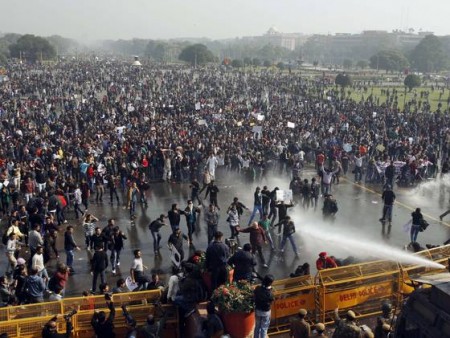Government makes bold move after criticism it is out of touch and ignored public revulsion over violence against women.
The Indian government is to publish the names, photographs and addresses of thousands of convicted sex offenders in a bid to tackle a wave of sexual violence against women, and head off growing anger at what has been seen as an inadequate and tardy response by elderly political leaders out of touch with a rapidly changing society.
The controversial measure, announced by the minister of state for home affairs, RPN Singh, is to start in the capital, where angry protests sparked by the gang rape of a 23-year-old physiotherapy student 10 days ago are continuing. The victim of the hour-long attack, who suffered serious internal injuries, has now been moved to a specialist hospital in Singapore. Her condition remains critical. Police chiefs and officials are to meet activists and experts on Friday to discuss implementation of the scheme.
“We are planning to start the process [of identification] in Delhi. Photographs, names and addresses of the rapists will be uploaded on the Delhi police website also,” Singh told reporters.
There are fears that identifying convicted rapists will lead to vigilante attacks. Others point out that with a conviction rate averaging 25% nationwide for rape cases, many charges taking several years to reach court and enormous numbers of incidents going unreported, the measure can only have a limited effect. Women’s rights campaigners have however backed the idea.
“It is true that there is a risk of such attacks but at the moment it is the victim who has to suffer the shame and social ostracism,” said Ranjana Kumari, director of Delhi’s Centre for Social Research. “She can’t get married, for example. This will make sure the rapist is shamed. He won’t get a job, or somewhere to live and will be cut off from society. This is a powerful deterrent,” Kumari, who is also a member of the national commission for empowerment of women, told The Guardian.
Authorities, already under fire for their failure to prevent the original attack, which took place on a Sunday evening in a bus moving on busy public roads, are now under pressure for their mishandling of the protests around India. Images of riot police beating back demonstrators carrying placards with slogans against violence who have attempted to reach parliament, the president’s official residence and the official homes of top officials in the center of Delhi, have reinforced the impression of an uncaring, out-of-touch government.
Earlier this week, Abhijit Mukherjee, the president’s son and an MP with the ruling Congress party, was forced to apologise after calling protestors “painted women” who “have little connection with ground reality” and “have nothing better to do”. The incident has revealed deep fissures within Indian society. Described as “eve teasing”, sexual harassment is endemic and rape systematically blamed on irresponsible women behaving in ways that are “un-Indian”.
Police routinely ignore complaints of sexual violence; senior officers have even suggested women fight rape by hurling chilli powder at their attackers. Bollywood films typically feature an initially distant girl who finally gives in to her determined, and often physically aggressive, suitor.
“India is currently in a Twilight Zone, when the traditional social norms have lost their resonance while modern values based on individual liberty have not yet gained acceptance,” said the financial newspaper Mint, in an editorial.
The six men responsible for the incident in Delhi included a driver of an unlicensed private bus, a vegetable seller and an assistant in a gym. Most had grown up in deeply conservative parts of rural India before moving to the capital. One consequence of the focus on sexual violence against women in the media in recent days has been coverage of incidents that normally would either be relegated to local editions of newspapers or not be covered at all.
A second alleged gang rape, this time of a 42-year-old woman, in a moving vehicle in Delhi made headlines. All major TV channels on Thursday reported the suicide of an 18-year-old woman near Patiala, a town in the north-western Punjab province two weeks after a serious sexual assault.
When she told local police she had been raped by three men from her village, their response was to jeer, relatives said. Officials have admitted a case was only registered – the first step in a criminal investigation in India – after her suicide last month. And in Bhopal, a 21-year-old has told police she was raped in the office of a senior politician six weeks ago.
Among demands by protesters are more severe punishments for rapists, including the death penalty. However laws protecting women are already on Indian statute books, the problem is haphazard implementation.
Kumari, one of those who suggested the public sex offenders’ register, said she was pleased by the government’s move but disappointed that finances devoted to women’s schemes had been cut at a meeting earlier this week.
“How are they going to make all these ideas to protect women work if they are not going to fund them? There is a fundamental lack of priority and political intent,” she said.
Also read India: Gang Rape Protests Dispersed By Cops Using Teargas And Water Cannons






